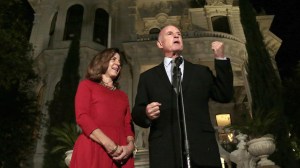Democrats suffered a staggering defeat nationally in the 2014 midterm elections, but in California, the party once again swept the state’s top offices.

Leading the way was incumbent Gov. Jerry Brown, who amassed more than 58 percent of the vote to defeat Republican opponent Neel Kashkari by about 17 percentage points — and more than 900,000 votes — to win an historic fourth term.
Speaking outside the governor’s mansion after winning Tuesday night, Brown called the unprecedented fourth term a “gift.”
“I’m going to do my utmost to live up to the promise of California that brought my great-grandfather … here to Sacramento in 1852,” he said.
Complete Results: California election returns data here
Read More: California Gov. Brown Wins 4th Term; Props 1 & 2 Pass
Lt. Gov. Gavin Newsom, the former mayor of San Francisco, also handily won reelection, beating beat GOP challenger Ron Nehring by nearly 12 percentage points.
Attorney General Kamala Harris was also reelected to a four-year term on Tuesday night, getting 56 percent of the vote to defeat Republican Ronald Gold.
Democrats also won in the secretary of state, treasurer, controller and insurance commissioner races.
California proved to be one of the lone bright spots for Democrats on election night. As sweeping victories allowed Republicans to gain control of the Senate and increase their majority in the House, the party once again failed to win a single statewide office in the Golden State Democratic stronghold.
Fresno Mayor Ashley Swearingen, the GOP candidate for controller who had once been thought the party’s lone hope for statewide office, garnered 47.2 percent of the vote to Board of Equalization member and Democrat Betty Yee’s 52.8 percent.
The secretary of state race proved, perhaps surprisingly, closer than any other race for statewide office. Former Los Angeles councilman and current state Sen. Alex Padilla, a Democrat, earned 52.5 percent of the vote to defeat the GOP’s Pete Peterson, who is the executive director of a civil engagement institute at Pepperdine University. Peterson earned 47.5 percent of the vote.
A GOP candidate hasn’t been elected to a statewide office in California since 2006.
In the nonpartisan race for superintendent of public instruction, reformer Marshall Tuck, who ran charter schools in Los Angeles, came up short against incumbent Tom Torlakson, a former state legislator and teacher. The contest was expected to be close and was watched by educators nationally, but Torlakson dispatched Tuck with a gap of more than 4 percentage points.
In other statewide contests, voters had the opportunity to cast their ballot on a slate of propositions.
Two ballot measures backed by Brown — Proposition 1, a $7.5 billion water bond; and Proposition 2, a “rainy day” fund for the state budget — both passed.
Four other measures were on the ballot, but only Proposition 47, which will reduce some felony drug and property crimes to misdemeanors, passed.
Voters failed to pass Proposition 45, an initiative that would allow the state insurance commissioner to reject health insurers’ rate changes for some types of coverage.
They also voted down Proposition 46, a measure that would have raised compensation caps in medical negligence lawsuits and required doctors to undergo drug testing.
Proposition 48 had asked voters to ratify a compact that would allow a Northern California Indian tribe to build a casino off its reservation. It was also rejected by voters.





